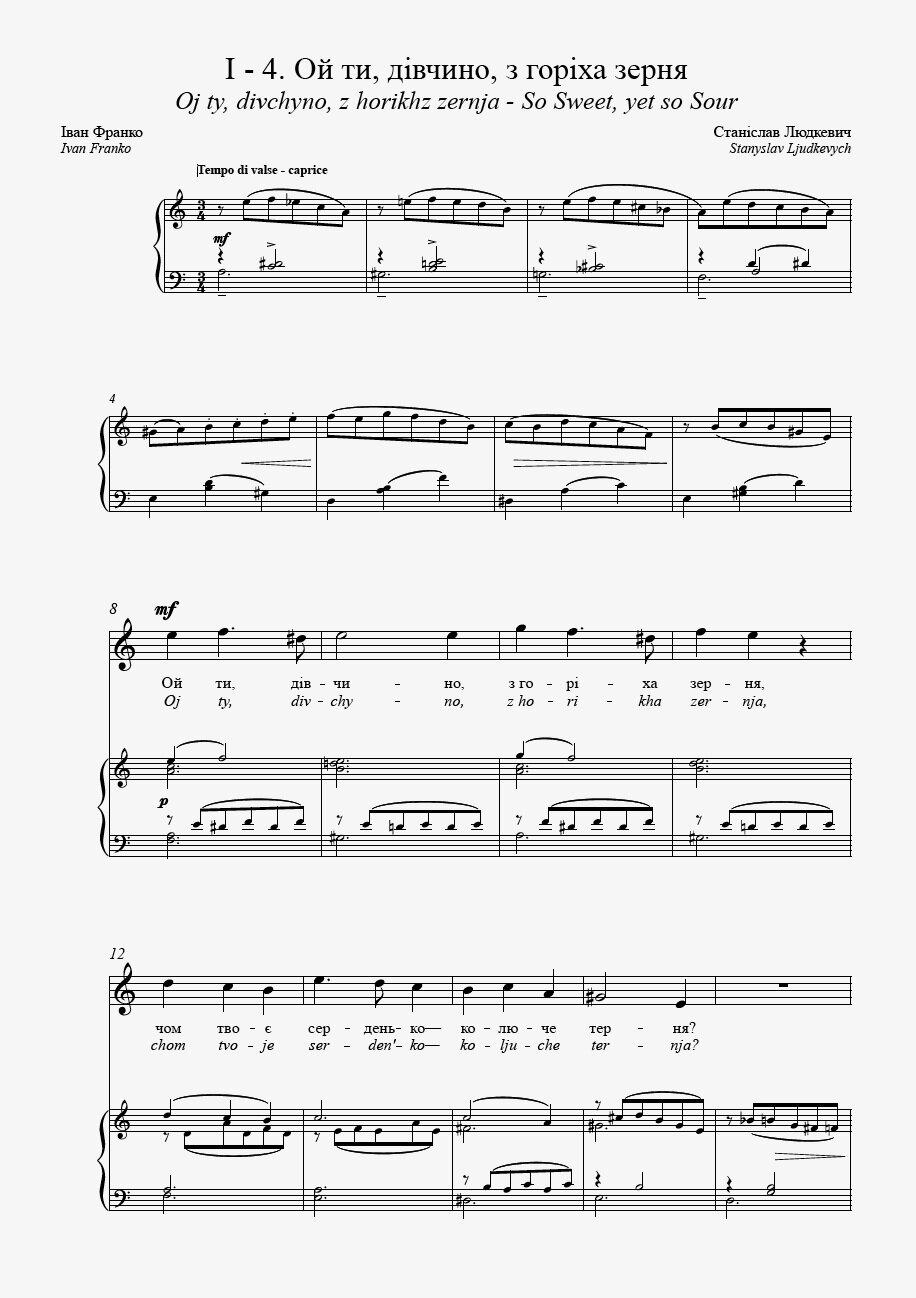The Ukrainian Art Song Project sends you this gift of love… ♪ So sit back, relax and enjoy the summer sunshine.
We invite you to listen to a beautiful interpretation of:
So Sweet, yet so sour ~ Ой, ти дівчино з горіха, зерня
by Stanyslav Liudkevych
Poem by Ivan Franko
Performed by
Performed by Russell Braun, baritone Carolyn Maule, piano
Ой, ти дівчино з горіха, зерня
Ой ти, дівчино, з горіха зерня,
Чом твоє серденько — колюче терня?
Чом твої устонька — тиха молитва,
А твоє слово остре, як бритва?
Чом твої очі сяють тим чаром,
Що то запалює серце пожаром?
Ох, тії очі темніші ночі,
Хто в них задивиться, й сонця не хоче!
І чом твій усміх — для мене скрута,
Серце бентежить, як буря люта?
Ой ти, дівчино, ясная зоре!
Ти мої радощі, ти моє горе!
Тебе видаючи, любити мушу,
Тебе кохаючи, загублю душу.
Цей інтимний ліричний вірш був неодноразово покладений на музику українськими композиторами. У мистецькій пісні Людкевича від 1958 року легкий граціозний ритм вальсу пронизує перший та заключний розділи твору. Кульмінація пісні, як це часто у композитора, вибухає на заключній фразі твору – “Тебе кохаючи, загублю душу!”
So Sweet, yet so Sour
Translation: Uliana Pasicznyk and Maxim Tarnawsky
You girl, like the seed of a walnut,
Why is your heart like prickly thorns?
Why are your lips a silent prayer,
And your words sharp, like a razor?
Why do your eyes shine with that magic,
That ignites a great flame in the heart?
Oh, those eyes, darker than night,
Whoever looks into them will forsake the sun.
And why is your smile such a burden for me,
Tearing apart my heart, like a fierce storm?
Oh you girl, bright star—
You are my happiness, you are my sorrow!
Now that I’ve seen you, I must love you,
Now that I love you, I’ll lose my soul.
Composed in 1958, this intimate, lyrical poem has been set to music by a number of Ukrainian composers. The light, graceful rhythm of a waltz defines the first and last parts of the composition. As is often in Liudkevych’s works, the final words of the song explode—“By loving you I will destroy my soul!”
Stanyslav Liudkevych (1879-1979)
Stanyslav Liudkevych first studied composition with his mother, a pupil of Mykhailo Verbytsky who wrote the music to Ukraine’s national anthem. While at university, Liudkevych was a pupil of Sołtys at the Lemberg Conservatory. Then in Vienna, he studied with Alexander Zemlinsky, Hermann Grädener, and Guido Adler; even attending Hugo Riemann’s lectures in Germany. In 1908, he succeeded Anatole Vakhnianyn as director of the Lysenko Institute.
During World War I, Liudkevych was drafted into the Austrian army. Captured by the Russians, he spent time in Kazakhstan as a prisoner of war. In 1919, he resumed work at the institute in Lviv. In 1936, Liudkevych became head of the musicological commission of the Shevchenko Scientific Society. From 1940 to 1972 he taught at the Lviv State Conservatory. Despite being a 20th-century composer, Liudkevych maintained a post-romantic palette that was later tempered by Soviet neo-folklorism. In fact, under the Soviet regime, his creative output dwindled. At one of the first meetings with the Communist Party in 1939, the composer is reputed to have quipped, “liberated [by the Communists]—there’s nothing one can do
about that…”
The Ukrainian Art Song Project has been bringing Ukraine's musical treasures to light since 2004. With your support, we will continue to bring Ukraine's finest composers and their masterpieces to the world stage, where they belong.
Проєкт "Українськa Мистецькa Пісня" поширює найкращі зразки української музики з 2004 року. З Вашою підтримкою ми продовжимо презентувати найкращих українських композиторів та їх шедеври, які належать до світової музичної спадщини.
Your gift can also be made through CanadaHelps as a one-time or monthly donation.








